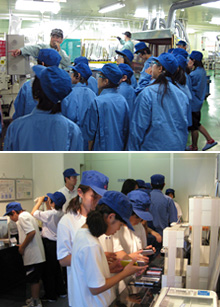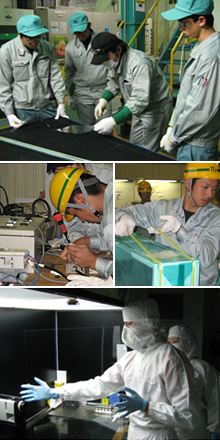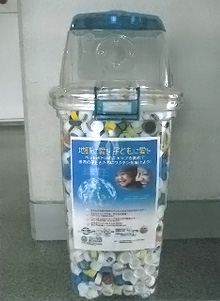Local Junior High School Students Visiting Yokkaichi Factory
Our Yokkaichi factory has been actively engaged in interacting with local communities in order to attract popularity within the region. One of the activities includes factory visits for junior high school students. The Yokkaichi factory of the Nippon Sheet Glass Group (NSG) organizes events for local junior high school students to visit the factory fabrication line and to introduce them to the relationship between glass and society and the manufacturing method of glass.
Glass has become an essential element of our daily lives. The factory visits have been a great opportunity for students to experience glass production at first hand and we receive their various questions every year.
Students also visit the NSG Community Hall where many of them show an interest in the display of various products such as LCDs for cell phones. As cell phones are considered a necessity for the younger generation, they seem to develop a sense of familiarity when they discover that cell phone screens are made using glass produced at our factory.
Factory visits are conducted during school hours. In order to deepen their understanding of the Yokkaichi port and its surrounding area, students visit actual facilities and companies. By observing the scene and the workers, they learn what it means to work in society.

Internship
Our Yokkaichi factory has been participating in the "Local Industry Leadership Development Project" (a project designated by the Ministry of Education, Culture, Sports, Science and Technology and the Ministry of Economy, Trade and Industry) promoted by the Mie Prefectural Board of Education and the Mie Industry Enterprise Support Center and offers an internship program for industrial high school students.
As one of the effective career education methods, the internship program provides opportunities for students to be exposed to practical knowledge and skills applied at work. The internship program gives students a chance to think about their professional aptitude and future plans. The program also has various educational effects such as helping students develop a positive learning attitude with a clear sense of purpose.
The internship program lasts for 3 days and students have the opportunity to experience actual operations of several processes.
First, students will experience the production process. Our production is divided into the HOT and COLD processes. The HOT process consists of the melting of the powdered raw material to produce plate-like mother sheet glass. The COLD process consists of cutting the mother sheet to the size specified by customers, edge-treatment, cleaning and inspection. In the HOT process, students have the chance to examine the production facilities and to cut glass with their own hands for sample checking. In the COLD process, they have the chance to experience how to handle glass and perform visual inspections.
In addition, students can experience facility maintenance, motor dissembling and assembling as well as packaging final glass products for shipping.
We hope to play a part in the "development of manufacturing talents" and that students will enhance their motivation for manufacturing through the experience of learning about our technology and skills in the lectures and practical training provided by our Yokkaichi factory employees.

Eco-Cap Campaign
In cooperation with the Yokkaichi branch of Nippon Sheet Glass Co., Ltd., we have launched the “Eco-Cap Campaign” at the AvanStrate headquarters in November 2009. The purpose of this campaign is to donate vaccines to children around the world using funds raised by collecting plastic bottle caps which are usually disposed of and selling them to recycling vendors. These caps are converted into funds through the Eco-Cap Promotional Committee, an NPO, and the vaccines are delivered to children around the world.
The Eco-Cap Campaign is also effective in raising awareness regarding separation of caps and bottles. Caps are made from polypropylene and cannot be recycled when they are disposed of together with bottles which are made of plastic.
On February 9th 2009, we sent the collected eco-caps to the committee for the first time The 3,280 caps (a total of 8.2kg!) can be used to contribute polio vaccines for 4.1 children. Although it is a small step, we are determined to continue this campaign going forward.
※400 caps are worth 10yen and a polio vaccine for 1 child can be purchased for 20yen.
※3,150g of CO2 is otherwise discharged if 400 caps are incinerated.







